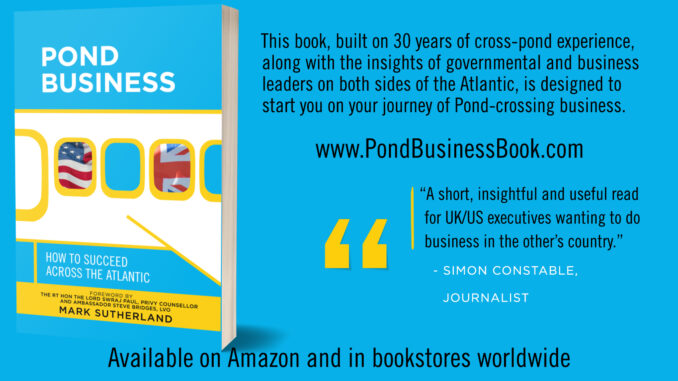
Excerpt from Chapter 5 of “Pond Business: How to Succeed Across the Atlantic” by Mark Sutherland, available from Dunrobin Publishing on Amazon and Amazon UK and in bookstores in the UK and the US.
One key element both countries must keep at the top of their minds is the fact that difference in perspective and culture can cause interactions and conversations to be interpreted differently than intended.
“British companies should not be too modest,” was the response from a senior member of the British Government when I brought this issue up to him. “British companies should tell Americans what they are good at, and why they should invest in or buy from them.” The sad truth is, many business deals have not happened because the British way of understating their expertise has been interpreted by American companies as meaning the Brits can’t do what the Americans thought they could.
I’ve seen it in the startup scene in particular. If you pitch in the US, like you would pitch in the UK, you won’t be taken seriously as they will see you as lacking confidence in your product. If you pitch in the UK like you would pitch in the US, you will come across as arrogant and braggadocios and, as a result, not someone to be taken seriously. The key to circumventing this issue is to acknowledge the differences in pitching from the beginning, so expectations are set, and cultural differences are minimized.
To build on that, US companies should not think that irony or self-deprecation means that a UK company or individual is not world class. In fact, the more self-deprecating someone is, it may just mean that they are one of the more successful individuals you’ve come across.
In fact Brits, you need to almost oversell yourselves when dealing with American companies. Not really, but it will probably feel like that as you are not used to that approach. At the very least, be confident about your assertions and plans, and make sure that confidence comes across. And don’t talk around your plans, actually talk about your plans. Get to the point. Get to the value. And get to the opportunity.
You can read more about my cross-Pond experiences and insights on how to succeed in your cross-Pond business ventures from corporate, governmental and organizational leaders in both countries in “Pond Business: How to Succeed Across the Atlantic.”